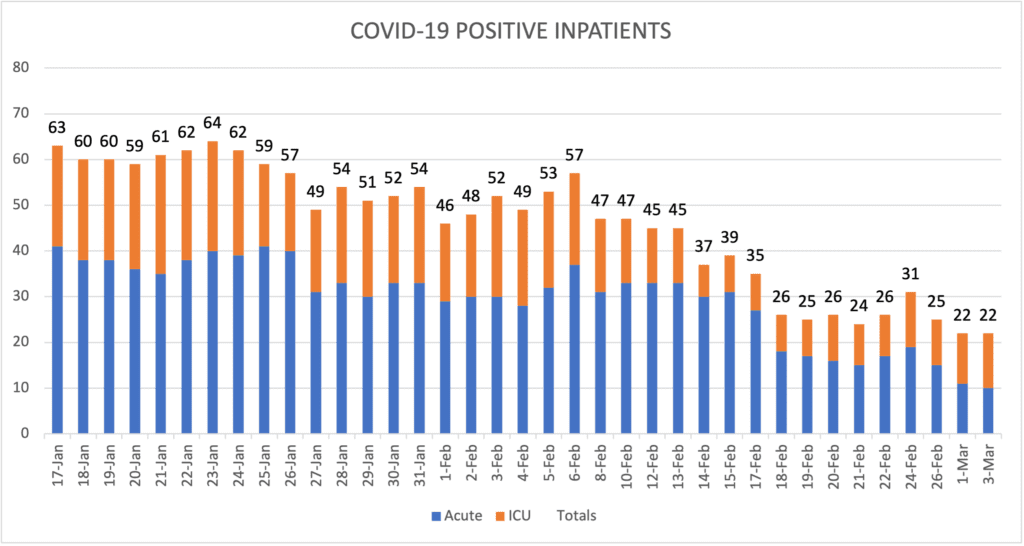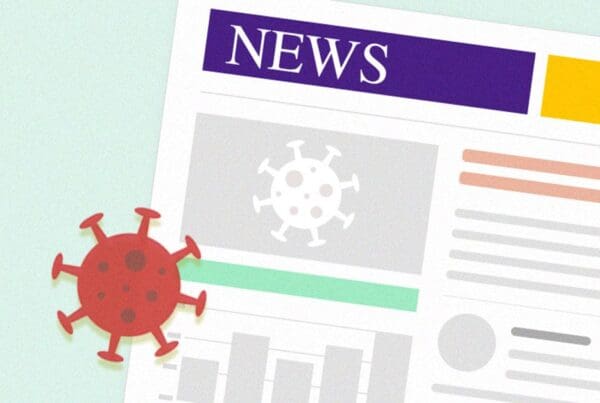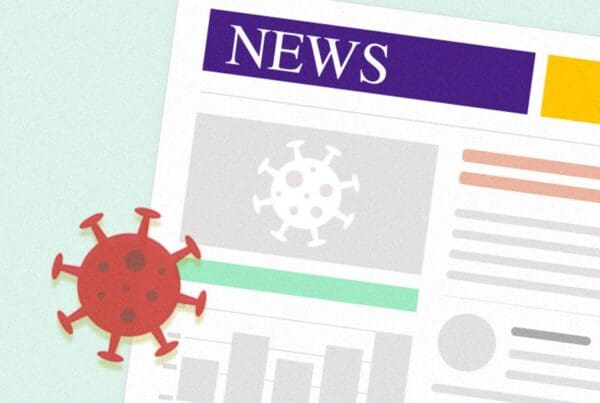Data Snapshot
UW Medicine Hospitals:

King County: The county reported 144 new positive cases and 5 new deaths on March 3.
Washington: The state reported 323,123 cases and 5,012 deaths as of March 3.
United States: The CDC reports 28,580,198 cases and 517,224 deaths as of March 4.
Global: WHO reports 114,853,685 confirmed COVID-19 cases and 2,554,694 deaths as of March. 4.
Numbers update frequently, please follow links for most up-to-date numbers.
UW Medicine COVID-19 Vaccine Distribution Update
Total Vaccine Doses Administered: 111,521
- Total first dose: 63,151
- Total second dose: 48,370
As of March 2, 2021.
UW Medicine in the News
NPR: Worried About Coronavirus Variants? Here’s What You Need To Know
Featuring: Trevor Bedford, Genome Sciences
“The fear is that just as humanity appears to be finally turning the corner in the battle against the virus, the variants could give the pathogen the upper hand once again. They could trigger a new surge. And new, even more worrisome variants could emerge because the virus is still spreading so widely. ‘They’re definitely something that we need to be paying attention to and designing our pandemic response around,’ says Trevor Bedford, a computational biologist at the Fred Hutchinson Cancer Research Center in Seattle. ‘I don’t think the sky is falling, but I think it’s something that absolutely bears attention.’ Viruses mutate all the time. Most of the time, those mutations don’t pose a threat. But the current crop of coronavirus mutations has made the virus more contagious and may have made the virus more likely to make people seriously sick. It appears the mutations may also make it more likely people could get reinfected and make the vaccines less effective. But we’re fighting back: The vaccines are rolling out, and so far it looks like they work against the variants to protect people from getting very sick or dying. If enough people in the U.S. can get vaccinated fast enough while also keeping up safe behaviors, this could prevent another major surge of cases and deaths. It could also help prevent new, dangerous variants from evolving because the more the virus spreads, the greater chance it has to mutate.”
JAMA Network: The Potential Future of the COVID-19 PandemicWill SARS-CoV-2 Become a Recurrent Seasonal Infection?
Featuring: Christopher Murray, IHME
“It is not clear whether COVID-19 will become a chronic seasonal disease. There is too much uncertainty about the probability and frequency of emergence of new variants, the reduction in vaccine efficacy for each variant, the critical question of cross-variant immunity, and the consistency of safe human behavior. However, the prospect of persistent and seasonal COVID-19 is real. If immunity from infection for the same SARS-CoV-2 variant or vaccine-derived immunity wanes, the prospect would increase further. There is much to learn in the coming months about variants, vaccines, and immunity. Recurrent seasonal COVID-19 could require both health system change and profound cultural adjustment for the life of high-risk individuals in the winter months. There is an urgent need to prepare for such a scenario by aligning surveillance, medical response, public health response, and socioeconomic programs.”
KTVQ Billings: UVC light being used in public spaces to clean air, surfaces of COVID-19
Featuring: Staci Kvak, Health Care Epidemiologist, UWMC
“Safely reopening America’s schools remains a big discussion. Many creative cleaning solutions have come out of the pandemic, and now some schools are using a technology more commonly associated with hospitals. ‘When this light is hitting things like, say, surfaces where there’s viruses or bacteria or anything like that, it penetrates through the outside of the bacteria or virus to the inner portions. It keeps it from replicating, basically destroys it inside so it’s no longer infectious,’ Staci Kvak, health care epidemiologist at the University of Washington Medical Center, said. It’s a technology that’s been used for years, and it’s a viable line of defense against COVID-19. When used correctly, it can kill the virus, as Kvak explains. ‘You have your manual cleaning with your chemical disinfectant, but there’s always that human factor where you know, ‘Oh, I missed the phone, I didn’t end up wiping that as well.’ We bring in the UV light as kind of our second line of defense,’ she said. It’s a seemingly simple solution for disinfecting surfaces and the air.”
COVID-19 Literature Report
COVID-19 Literature Situation Report is a daily (M-F) newsletter put together by the Alliance for Pandemic Preparedness that provides a succinct summary of the latest scientific literature related to the COVID-19 pandemic.
Key Takeaways: COVID-19 Literature Situation Report March 3, 2021
- A study of the real-world effectiveness of the Pfizer-BioNTech and Oxford-AstraZeneca vaccines indicated that vaccination with a single dose of either vaccine was associated with a significant reduction in symptomatic COVID-19 cases in older adults, with strong protection against severe disease. More.
- On January 25, 2021, the Minnesota Department of Health identified the first US cases of infection with the SARS-CoV-2 variant P.1 in two individuals with recent travel history to Brazil. No high-risk exposures were identified among health care personnel with whom these individuals interacted and no positive test results were reported. More.
- Large scale whole genome sequencing of a large number of SARS-C0V-2 samples from clinical isolates in Houston identified the presence of all variants of interest (B.1.1.7, B.1.351, P.1, B.1.429 and B.1.427). None of the affected patients were from a common household or reported recent international travel. More.
COVID-19 Literature Surveillance Team, is an affiliated group of medical students, PhDs and physicians keeping up with the latest research on SARS-CoV-2 / COVID-19 by finding the newest articles, reading them, grading their level of evidence and bringing you the bottom line.
Read the latest report: March 3 | Daily COVID-19 LST Report.
Listen to the latest podcast: Week of Feb. 15 | COVID-19 LST Podcast.
Tweet of the Week
Dr. Anna Wald @UWMedicine points out efficacy numbers for the Johnson & Johnson vaccine are higher than the annual flu. She also adds the J&J #COVID19 vaccine is just one dose. @abbyacone @IHME_UW https://t.co/Qak7KT9w44
— UW Medicine Newsroom (@uwmnewsroom) March 3, 2021

